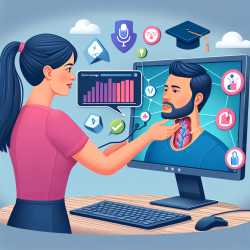Introduction to Tele-Dysphagia Management
The management of dysphagia, a swallowing disorder often associated with serious conditions like stroke, is a critical area in speech-language pathology. With the increasing incidence of dysphagia and a shortage of specialized clinicians, tele-dysphagia management presents a viable solution. The research article "Tele-Dysphagia Management: An Opportunity for Prevention, Cost-Savings and Advanced Training" highlights the potential of telepractice in enhancing patient outcomes and reducing healthcare costs.
The Growing Need for Tele-Dysphagia Management
As the population ages and medical advancements prolong life, the prevalence of dysphagia is on the rise. Unfortunately, the number of qualified dysphagia clinicians is not keeping pace. This gap is particularly evident in rural and underserved areas, where access to specialized care is limited. Tele-dysphagia management offers a promising strategy to bridge this gap by leveraging technology to connect local clinicians with remote experts.
Benefits of Tele-Dysphagia Management
- Prevention of Complications: Dysphagia can lead to aspiration pneumonia, a serious condition that significantly increases mortality rates. By facilitating timely and accurate assessments, tele-dysphagia management can help prevent such complications.
- Cost-Savings: The economic impact of dysphagia-related hospitalizations is substantial. Tele-dysphagia management can reduce hospital admissions and shorten lengths of stay, potentially saving the healthcare system millions of dollars annually.
- Advanced Training for Clinicians: Telepractice not only enhances patient care but also provides ongoing training opportunities for local clinicians. By collaborating with remote experts, primary clinicians can improve their skills and knowledge in dysphagia management.
Implementing Tele-Dysphagia Management
For practitioners looking to enhance their skills in dysphagia management, implementing tele-dysphagia consultations is a strategic move. Here are steps to consider:
- Invest in Technology: Ensure you have the necessary technology to facilitate remote consultations, including reliable internet connections and appropriate telepractice software.
- Collaborate with Experts: Establish partnerships with dysphagia specialists who can provide remote consultations and training.
- Develop Protocols: Create clear protocols for conducting tele-dysphagia assessments to ensure consistency and quality in service delivery.
- Engage in Continuous Learning: Stay updated on the latest research and advancements in tele-dysphagia management to continually refine your practice.
Conclusion
Tele-dysphagia management offers a transformative approach to addressing the challenges of dysphagia care. By embracing this model, practitioners can enhance their clinical skills, improve patient outcomes, and contribute to significant cost-savings in the healthcare system. For those interested in exploring this area further, the original research paper provides valuable insights and data-driven evidence.
To read the original research paper, please follow this link: Tele-Dysphagia Management: An Opportunity for Prevention, Cost-Savings and Advanced Training.










